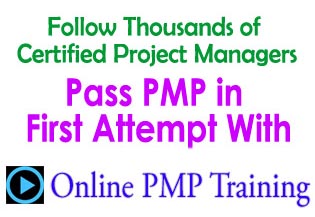 Updated for the Changes to the PMP Exam from 31-August-2011. There are now 8% questions from Closing Process Group.
Updated for the Changes to the PMP Exam from 31-August-2011. There are now 8% questions from Closing Process Group.
While conducting PMP Exam Preparation workshops, I have noticed that many participants are confused about the Contract Closure (Close Procurements) and Administrative Closure (Close Project or Phase) processes.
Which comes first? What are the differences in these 2 processes?
The confusion stems from them working in different organization – some come from a buyer organization, whereas others have experience from the sellers organization – specially where they work on projects awarded as contracts to their organizations.
Atleast 16 questions come from the Closing Process Group, and they are not so difficult to answer. Getting the basics right on these 2 processes will help you get 16 questions correct on the PMP exam.
In this post, I want to talk about the 2 closure processes, and explain the differences, so that PMP credential aspirants can benefit and better prepare for the PMP exam.
Administrative Closure:
This is the final completion and closure of the project. Part of the Integration Management knowledge area, the Close Project or Phase process is done when all the work has been verified, delivered, and accepted by the customer. All open issues have been raised, and finalized (come to a conclusion and closure).
The contracting parties – buyer and the seller both agree that the seller has completed the work stipulated in the contract, and the buyer has accepted it.
Contract Closure:
A contract is closed upon reaching the end of the contract, or when a contract is terminated before he work is completed (usually by the buyer – if the work is no longer required, or if the work performed is not acceptable due to quality or other reasons). The seller may still need to be compensated for the work completed, as goverend by the clauses in the contract.
In multi-phase projects, Close Procurements closes the appropriate contract(s) for that phase of the project. Thus, the Close Procurements process may be repeated many times in a project.
Unresolved claims may be subject to litigation after Close Procurements is completed. A complete set of indexed contract documentation, including the closed contract, is prepared for inclusion in the final project files – Output of Close Procurements.
Key Difference:
- Procurement Closure or Contract Closure is done before the project can be closed completely.
- Procurement Closure may be done multiple times ( once for each contract) during the lifecycle of a project.
- Administrative Closure is only done once per phase, or for the entire project. Project closure is not complete without procurement closure.
- Product acceptance is carried out using the Close Project or Phase process.
- The contracts are closed using teh Close Procurement process.
Mock PMP Exam Questions:
1. You are the project manager of the Quick WeightLoss Mix Project. The project is to create the right mix of ingredients for the herbal pills that help to reduce the weight within 6 weeks. You have found the right formula for the weight loss pills. You are now preparing to close the project. Which of the following is not an input to the Close Project or Phase process?
A. Project management Plan
B. Project deliverables validated through the quality control processes
C. Final project audits
D. Acceptance Criteria
Correct Answer: B. Validated deliverables are first sent to Verify Scope to become Accepted Deliverables.
2. You have reached the end of the project. To end a project, which process must be performed last:
A. Verify Scope
B. Close Project or Phase
C. Close Procurements
D. Complete Project
Correct Answer: B.
3. What is the correct order of performing the processes?
A. Perform Quality Control, Close Project or Phase, Close Procurements
B. Verify Scope, Perform Quality Control, Close Project or Phase, Close Procurements
C. Perform Quality Control, Verify Scope, Close Project or Phase
D. Verify Scope, Perform Quality Control, Close Procurements
Correct Answer: C.
4. Who can authorize the closure of a project?
A. Sponsor
B. Project Manager
C. Functional Manager
D. Customer
Correct Answer: A. The Sponsor was the one who sactioned the project, so he/she must be the one to formally accept and close the project.
That’s it for now. Hope this helps you in preparing for the PMP exam. Let me know your comments and feedback on this.
Cheers
Vinai, PMP
Founder: PMChamp.com
Get 20 Free Mock Questions on Quality Management
Just fill in your details here:


Hello
I am a little bit confuse with this question as for me I have to proceed with the scope verification before performing Quality Control.
Can you please explain me
3. What is the correct order of performing the processes?
A. Perform Quality Control, Close Project or Phase, Close Procurements
B. Verify Scope, Perform Quality Control, Close Project or Phase, Close Procurements
C. Perform Quality Control, Verify Scope, Close Project or Phase
D. Verify Scope, Perform Quality Control, Close Procurements
i am doing preparation for CAPMso pl tell me/guide me for that
Malika, You always do Quality Control first – where Deliverables get converted into Validated Deliverables. This is a quality control function.
This then becomes the input to the next process – Verify Scope. Here is where validated deliverables become accepted deliverables.
Once the deliverables have been accepted by the customer, we can then initiated the Close Project or Phase.
Hope this clarifies.
Cheers,
Vinai
Hi,
While I totally agree that procurement closure must happen before Administrative closure of the project, in some of the mock exams I have done, the answer appears to be the other way around.
Q: Which of the following processes are performed in the Closing process group and in which order?
A1: Contract closure and then Scope verification
A2: Contract closure and then Close Project
A3: Close Project and then Contract Closure
A4: Scope verification and then Close Project
The correct answer here is A3 which doesnt make any sense to me.
Can you please clarify?
tx,
sg